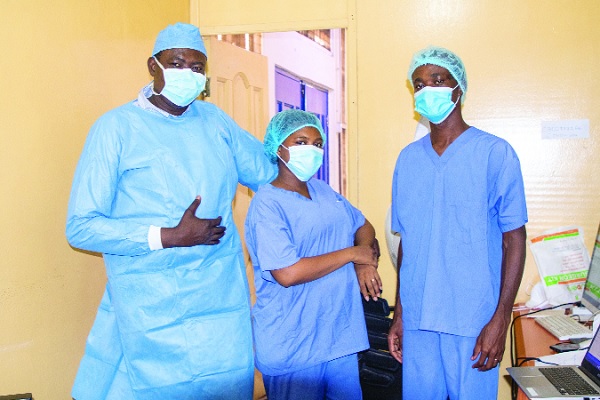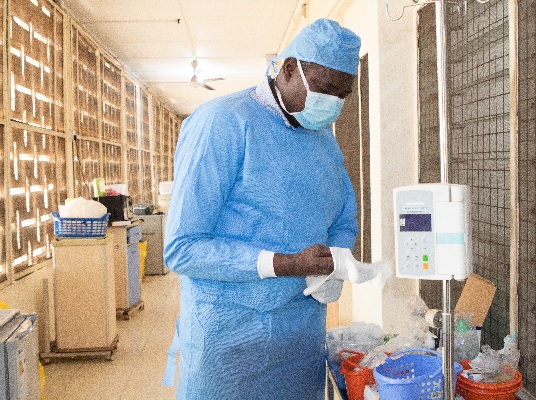
Fitting reward for COVID-19 hero; the exemplary story of Dr Addipa-Adapoe
It is often said that every crisis produces its heroes.
In the face of the coronavirus (COVID-19) pandemic, the world's biggest health crisis of our time, our healthcare workers — doctors, nurses and support staff — who risk becoming infected themselves and could put their own families in danger, are making extraordinary sacrifices to take care of patients.
Advertisement
Ghana's impressive case management has been, in part, due to remarkable sacrifices by some health workers who went beyond the call of duty to save lives.

Dr Addipa-Adapoe treating a COVID-19 patient at the Intensive Care Unit
And it is this dedication to duty that moved a COVID-19 survivor to donate a brand new Toyota saloon car to Dr Emmanuel Addipa-Adapoe, a medical officer at the Greater Accra Regional Hospital (also known as Ridge Hospital), in appreciation of the care and the treatment she received in her time of crisis.
The COVID-19 survivor, who wants to remain anonymous, was full of praise for Dr Addipa-Adapoe for what she described as his hard work to ensure that all his patients pulled through their illness at the COVID centre.
Anonymous philanthropist
The survivor told The Mirror that even though other healthcare practitioners attended to her while on admission, she was moved by the dedication to duty and the sacrifices made by Dr Addipa-Adapoe to ensure her full recovery.
"The extent to which this young doctor would go to ensure that I and other patients had enough oxygen supply was simply remarkable. There were times I saw him being recalled from home after a long day at work. Yet, he came with all the energy to attend to patients,” recounted the survivor, a woman in her mid-50s who works in the corporate world.

The anonymous philanthropist (left) presenting the saloon car to Dr Addipa-Adapoe. Looking on is Dr Emmanuel Srofenyo, the Medical Director of the Greater Accra Regional Hospital
The philanthropist narrated with a sense of gratitude how she felt weak, helpless and frightened but was always encouraged by the doctor which gave her hope to fight on while on her sick bed.
“Dr Addipa-Adapoe frequents the centre just to ensure patients are not under distress and ends up leaving very late. Yet, by the next morning, you will find him by your bedside comforting and helping out with exercises in the ward just to make you fit. Because of my condition, I felt extremely weak but this doctor urged me on, carried a chair to follow each step I make then I sit for a while then continue. After this he does percussions on my back to improve airway clearance,” she chronicled about her battle for life.
Close-up with Dr Addipa-Adapoe
On Monday, The Mirror team visited the Greater Accra Regional Hospital to look out for Dr Addipa-Adapoe.
It was business as usual for the stout medical practitioner who was on his routine rounds at the wards of the main hospital building before ending up at the COVID Intensive Care Unit (ICU).
At the ICU, Dr Addipa-Adapoe changed into full personal protective equipment (PPE) and entered the 16-bed capacity ward to attend to critical cases of patients on oxygen/ventilators and infusions.
Also present was a medical team of doctors and nurses who were busy behind their computers working on reports.

Dr Addipa-Adapoe with some of his team members at the COVID Intensive Care Unit
The sight of various heart monitoring devices, huge oxygen cylinders positioned at different corners with trolleys filled with cotton wool, syringes, thermometers, boxes of gloves and medication in the ICU was a clear indication that treatment and handling of COVID-19 cases was no child’s play.
The Mirror team had the privilege of following Dr Addipa-Adapoe and heard some patients complain of difficulty in breathing while others experienced headaches and feverish conditions.
Afterwards, a nurse on duty reported that they had lost about four patients in the past weeks.
Despite the pain of losing a few lives under their care, there was a feeling of fulfilment by the medical team following the discharge of a patient who had fully recovered from the deadly disease.
There were scenes of joy as nurses disinfected the discharged patient's luggage and presented him with some hand sanitiser and face masks, while Dr Addipa-Adapoe counselled him to keep observing the COVID-19 safety protocols and to take all his medications.
Background of Dr Addipa-Adapoe
Dr Addipa-Adapoe describes himself as a Guan and Ewe from the Oti and Volta regions respectively.
His father was the late Major (retd) Edward Addipa and his mother, Ms Elizabeth Adapoe.
His surname is a curious combination of both his father and mother’s surnames.
“I was raised by the Adapoes so I decided to add their name to my father’s name,” he explains heartily.
He started school at the AME Zion at Adina in the Ketu South Municipal District in the Volta Region and moved to Accra to continue at the Snaps Preparatory and JHS.
He later gained admission to the Presbyterian Boys' Secondary School (PRESEC) Legon in Accra and prides himself as an Odadeɛ (past student of PRESEC).
“I enrolled with the Medical Laboratory Technology at Korle Bu and graduated as a medical laboratory scientist. After my training, I practised for five years and left to Hebei Medical University in China to pursue a programme in medicine. From China, I came back home and wrote an examination for foreign students with the Ghana Medical and Dental Council which is a statutory agency that regulates the standards of training and the practice of medicine and dentistry in Ghana.
“My first year of housemanship was at the Ridge Hospital Surgical and Paediatrics departments. During the first six months of my second year, I volunteered to go to Donkorkrom in the Kwahu Afram Plains North District of the Eastern Region to work with the Presbyterian Hospital. There I was exposed to every issue related to female reproductive health, fertility, hysterectomy, among others,” he said.
Dr Addipa-Adapoe recounted an incident at Donkorkrom where he was compelled to fall on a pick-up truck as an improvised ambulance to transport a baby to the Koforidua Government Hospital with an oxygen cylinder tied in the bucket of the vehicle to keep the baby alive.
In another feat, Dr Addipa-Adapoe is known to have helped to deliver a woman in labour of a healthy baby.
After completing his last six months of housemanship at the Pentecost Hospital at Madina in Accra, he became a medical officer and was posted to the Greater Accra Regional Hospital.

Dr Emmanuel Addipa-Adapoe, a medical officer at the Greater Accra Regional Hospital.
Pictures: DAVID PAA KWASI ABLE
He was among doctors who advocated strongly for the use of a standardised, three-layered wax print designed as a face mask for the control of COVID-19 during a severe shortage of surgical masks in the early days of COVID-19 management in the country.
COVID-19 cases
Dr Addipa-Adapoe speaks with a sense of pride that COVID-19 cases at their centre has seen a steady decline.
“New cases are not coming as many as we used to have them last year. We are still having some referrals though not as much as the peak of the COVID-19 last year,” he said.
Nonetheless, he cautions people not to feel complacent to drop their guard.
He wants everyone, including those who have been vaccinated against the virus, to mask up anytime they stepped out to prevent exposure to the virus.

Dr Emmanuel Addipa-Adapoe fixing a hand gloves to begin the day's activities
“It will surprise you to know that there are cases of people who have tested positive even after taking the first vaccination. This tells you how serious COVID is. Although now some of us have gone in for our second vaccination, it is still important to observe the protocols. COVID-19 is no respecter of persons. There is this assumption out there that COVID-19 is for the upper class of people or an urban infection,” he added.
“Testing and treatment at our centre is free. For those who test positive and are not in critical condition, they are referred to the Out Patients Department (OPD) where they are checked and asked to go into self-isolation at home.
“Ideally, it is good to have a pulse oximeter at home, especially when you go into self-isolation. It is a painless test that measures the oxygen levels in your blood. It can rapidly detect even small changes in how efficiently oxygen is being carried to the extremities furthest from the heart, including the legs and the arms. This is key because sometimes a mild case can move to moderate to severe within a twinkle of an eye so it is good to check your oxygen level,” he explained.
Dr Addipa-Adapoe said oxygen supply was critical in the management of COVID-19 cases.
“We have a manifold system and so we deliver the oxygen to a number of patients at the same time. Within a minute about 15 litres will have been given out to keep a patient alive at the centre,” he indicated.



